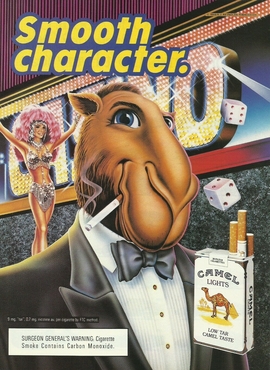
Joe Camel was an advertising mascot used by the R. J. Reynolds Tobacco Company (RJR) for their cigarette brand Camel. The character was created in 1974 for a French advertising campaign, and was redesigned for the American market in 1988. He appeared in magazine advertisements, clothing, and billboards among other print media and merchandise.

Brown & Williamson Tobacco Corporation was a U.S. tobacco company and a subsidiary of multinational British American Tobacco that produced several popular cigarette brands. It became infamous as the focus of investigations for chemically enhancing the addictiveness of cigarettes. Its former vice-president of research and development, Jeffrey Wigand, was the whistleblower in an investigation conducted by CBS news program 60 Minutes, an event that was dramatized in the film The Insider (1999). Wigand claimed that B&W had introduced chemicals such as ammonia into cigarettes to increase nicotine delivery and increase addictiveness.
Virginia Slims is an American brand of cigarettes owned by Altria. It is manufactured by Philip Morris USA and Philip Morris International.

Pall Mall is a British brand of cigarettes produced by British American Tobacco.
Benson & Hedges is a British brand of cigarettes owned by American conglomerate Altria. Cigarettes under the Benson & Hedges name are manufactured worldwide by different companies such as Rothmans, Benson & Hedges, Philip Morris USA, British American Tobacco, or Japan Tobacco, depending on the region. In the UK, they are registered in Old Bond Street in London, and were manufactured in Lisnafillan, Ballymena, Northern Ireland, before production was moved to Eastern Europe in 2017.
Capri is an American brand of cigarettes. It is currently owned and manufactured by the R. J. Reynolds Tobacco Company.
Newport is an American brand of menthol cigarettes, currently owned and manufactured by the R. J. Reynolds Tobacco Company. The brand was originally named for the seaport of Newport, Rhode Island.

Nicotine marketing is the marketing of nicotine-containing products or use. Traditionally, the tobacco industry markets cigarette smoking, but it is increasingly marketing other products, such as electronic cigarettes and heated tobacco products. Products are marketed through social media, stealth marketing, mass media, and sponsorship. Expenditures on nicotine marketing are in the tens of billions a year; in the US alone, spending was over US$1 million per hour in 2016; in 2003, per-capita marketing spending was $290 per adult smoker, or $45 per inhabitant. Nicotine marketing is increasingly regulated; some forms of nicotine advertising are banned in many countries. The World Health Organization recommends a complete tobacco advertising ban.
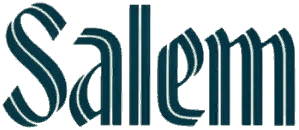
Salem is an American brand of cigarettes, currently owned and manufactured by ITG Brands, a subsidiary of Imperial Tobacco, inside the U.S. and by Japan Tobacco outside the United States.
Viceroy is an American brand of cigarettes, currently owned and manufactured by R. J. Reynolds Tobacco Company in the United States and British American Tobacco outside of the United States.
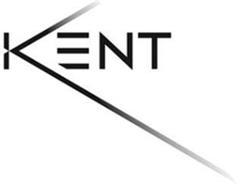
Kent is an American brand of cigarettes, currently owned and manufactured by R.J. Reynolds Tobacco Company in the United States and British American Tobacco elsewhere. The brand is named after Herbert Kent, a former executive at Lorillard Tobacco Company.
Doral is an American brand of cigarettes, currently owned and manufactured by the R.J. Reynolds Tobacco Company.
Winston is an American brand of cigarettes, currently owned and manufactured by ITG Brands, subsidiary of Imperial Tobacco in the United States and by Japan Tobacco outside the U.S. The brand is named after the town where R. J. Reynolds started his business which is Winston-Salem, North Carolina. As of 2017, Winston has the seventh-highest U.S. market share of all cigarette brands, according to the Centers for Disease Control and Prevention and the Maxwell Report.

The Snark is a line of lightweight sailboats, the most popular of which is the two-person, lateen-rigged sailboat Super Snark manufactured and marketed by Meyers Boat Company of Adrian, Michigan. The Snark was initially marketed by Snark Products, Inc. of Fort Lee, New Jersey and has been marketed with numerous slight variations, most prominently as the Sea Snark, Super Snark and Super Sea Snark. Other Snark models include the Sunchaser, and the Sea Skimmer. Among discontinued Snark models are the Triumph trimaran, the Mach I, the Sundancer and the Sea Swinger.

A menthol cigarette is a cigarette infused with the compound menthol which imparts a “minty” flavor to the smoke. Menthol also decreases irritant sensations from nicotine by desensitizing receptors, making smoking feel less harsh compared to regular cigarettes. Some studies have suggested that they are more addictive. Menthol cigarettes are just as hard to quit and are just as harmful as regular cigarettes.

Merit is an American brand of cigarettes, currently owned and manufactured by Philip Morris USA in the United States and Philip Morris International outside the United States.
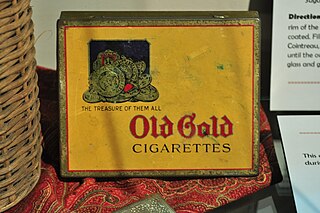
Old Gold is an American brand of cigarette owned and manufactured by the R. J. Reynolds Tobacco Company.
Tobacco marketing targeting African-Americans refers to the practice of customizing tobacco products and advertising techniques specifically to African-American consumers. It is most commonly analyzed through the consumption of mentholated cigarettes, as it represents 47% of black adult smokers and 84% of adolescent black smokers.
Maverick, is an American brand of cigarettes, currently owned and manufactured by ITG Brands, a subsidiary of Imperial Tobacco.
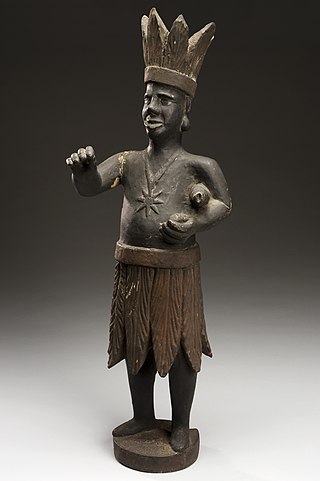
The history of nicotine marketing stretches back centuries. Nicotine marketing has continually developed new techniques in response to historical circumstances, societal and technological change, and regulation. Counter marketing has also changed, in both message and commonness, over the decades, often in response to pro-nicotine marketing.












